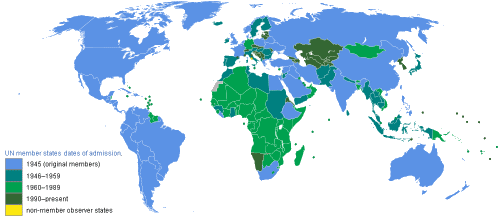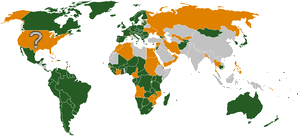
League of Nations
Despite Wilson’s efforts to establish and promote the League, for which he was awarded the Nobel Peace Prize in October 1919, the United States did not join the League. Opposition in the U.S. Senate, particularly from Republican politicians Henry Cabot Lodge and William E. Borah, together with Wilson’s refusal to compromise, ensured that the United States would not ratify the Covenant.
In contrast, the UN, founded after World War II gradually spread to encompass the entire world, surviving the rise and fall of World Communism. It must’ve been time:

The … United Nations (UN) is an international organization whose stated aims are facilitating cooperation in international law, international security, economic development, social progress, human rights, and the achieving of world peace. The UN was founded in 1945 after World War II to replace the League of Nations, to stop wars between countries, and to provide a platform for dialogue. It contains multiple subsidiary organizations to carry out its missions.

Ratified, Signed but not Ratified, Not signed
The Obama administration has resisted efforts by the International Criminal Court to include ‘aggression’ as a crime, mainly because it could impact US military operations abroadChristian Science Monitor
By Howard LaFranchi
June 15, 2010The United States under the Obama administration has developed an increasingly close working relationship with the International Criminal Court in The Hague. But that growing engagement with a controversial institution of international law was unable to prevent the ICC from expanding the scope of its work to include the murky crime of “aggression,” a move the US had vehemently opposed. At the 111-nation ICC’s first review conference that wrapped up last week in Kampala, Uganda, delegates decided to expand the international court’s purview to include the crime of aggression – a crime that only the US has successfully tried, in the post-World War II tribunals in Nuremburg and Tokyo.
State Department officials say the US, which is not a signatory to the ICC, was able to mitigate the drawbacks of such an expansion of the court’s reach, primarily by putting off any prosecution of the newest international crime until at least 2017. But some critics say the US failure to stop the enshrining of “aggression” as an international crime demonstrates the limits of President Obama’s multilateralist vision – and sets the US on a collision course with the ICC when the issue comes up again later in the decade.
“The fact remains that the Obama administration’s vaunted ‘engagement’ strategy was only able to check the ICC’s move towards defining ‘aggression,’ not stop it entirely,” says Brett Schaefer, an expert in international institutions at the Heritage Foundation in Washington. “And it sets the US up for another battle in 2017 when the ICC’s advocates will make another push to activate the ICC’s jurisdiction over ‘aggression.’”
The US confirmed its new footing with the world’s first permanent court for trying war crimes and crimes against humanity, US officials say, although they acknowledge that the US did not get everything it wanted in Kampala. The Rome Statute establishing the ICC was finalized in 1998, but the court did not begin to function until 2002, when the minimum 60 countries ratified it.
US participation in the Kampala conference “reset US relations with the court from hostility to positive engagement,” says State Department legal adviser Harold Koh. He says the US focus at the review conference was on efforts to “strengthen justice on the ground” in countries so that eventually their judicial systems will be strong enough to take on the kinds of human-rights work the ICC addresses…
One of the main US concerns in seeing “aggression” added to the ICC’s jurisdiction was the impact it could potentially have on US military operations abroad. But Koh says the US successfully negotiated the “aggression” statute’s wording so that US forces won’t be susceptible to it. “No US national can be prosecuted for ‘aggression’ while the US is not a signatory” to the ICC, he says.
While we don’t necessarily like to think of ourselves as war mongers, but we are prone to fight [UN sanctioned in blue]:
| Dates | War | Dates |
War |
|
|
|||
| 1675 – 1676 | King Philip’s War | 1861-1865 | U.S. Civil War |
| 1689-1697 | King William’s War | 1898 | Spanish-American War |
| 1702-1713 | (War of Spanish Succession) | 1914-1918 | World War I |
| 1744-1748 | (War of Austrian Succession) | 1939-1945 | World War II |
| 1756-1763 | French and Indian War | 1950-1953 | Korean War |
| 1759-1761 | Cherokee War | 1960-1975 | Vietnam War |
| 1775-1783 | American Revolution | 1961 | Bay of Pigs |
| 1798-1800 | Franco-American Naval War | 1983 | Grenada |
| 1801-1805 | Barbary Wars | 1989 | Invasion of Panama |
| 1812-1815 | War of 1812 | 1990-1991 | Persian Gulf War |
| 1813-1814 | Creek War | 1995-1996 | Bosnia and Herzegovina |
| 1836 | War of Texas Independence | 2001 | Invasion of Afghanistan |
| 1846-1848 | Mexican-American War | 2003 | Invasion of Iraq |
|
|
|||
| |
|||
Our wars between the end of World War II and the fall of Communism were part of our foreign policy of "containment" [the only success was Grenada]. Since that time, the wars have been about "rogue states" – two under the UN auspices [Persian Gulf War & the Invasion of Afghanistan], and one a humanitarian war with NATO [Bosnia and Herzegovina]. But if Aggression is the topic, the US is close to the top of the list.
I personally find it sad that the US is a major opponent of the new world court having jurisdiction over the Crime of Aggression. While I can somewhat understand our wish to maintain our options, the last time we played an option was a major league disaster. We can do without another Iraq until the end of time. The Bush Administration basically wanted to dis the UN and take on the job of world cop. I see no reason to protect our right to do that again.
[…] the crime of aggression… It’s hard for me to accept that the United States of America, land of the free and home of the brave is a major force opposing a World Court to oversee criminal wars. President Clinton only signed on tentatively. His reluctance was over worries that U.S. citizens might be prosecuted for our intervention in Bosnia and Herzegovina. But then: After the Rome Statute reached the requisite 60 ratifications in 2002, President George W. Bush’s Administration sent a note to the UN Secretary General on May 6, 2002. The note suspended the signature of the US and informed the Secretary General that the US recognized no obligation toward the Rome Statute. In addition, the US stated that its intention not to be become a member state be reflected in the UN depositry’s list. This is because signatories have an obligation not to undermine the object and purpose of a treaty. The US could engage with the Court by reactivating its signature to the Rome Statute by a letter to the UN Secretary General. A treaty that is not ratified is not legally binding. What was going on in that summer of 2002? Well, we regular Americans were driving around with magnetic American Flags on our cars, still reeling from 9/11. Behind closed doors, the Bybee/Yoo torture memos were framed and signed. Abu Zubaydah and Ibn al-Shaykh al-Libi were in custody and being tortured. Bush had introduced the "Bush Doctrine" in his West Point Commencement Address. The WHIG group was about to be formed to advertise the coming invasion of Iraq. According to the Downing Street Memo, our war plans were set and we were going to skip the UN. So Bush’s withdrawing from the World Court [ICC] was a harbinger of the coming invasion. […]